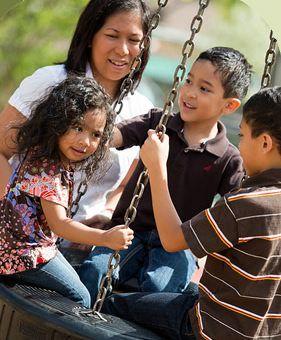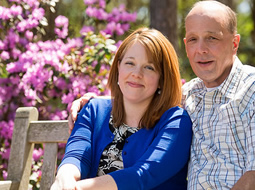After You

Photo by Edda Pacifico
Advisory committee members pave the way for positive care experiences for future patients
For Cristina Reed, cancer survivorship can be difficult. Though she’s had stage 4 non-Hodgkin’s lymphoma, the doctors caught it and used chemotherapy to get the disease on track. Sometimes, even now after her five-year scan came back clear, she feels guilty for surviving.
"Do I dare say my cancer experience was ideal," Reed says. "Yes, my kids were little, but I am still around. My oncologist was very proactive with me. My husband did the research and sought information to ensure I got to U-M. I responded well to chemo."
Reed decided the best way to make sense of her eight-month stint as a young mom battling cancer was to try to ease the path for the next person who has to walk in her shoes. She joined the U-M Rogel Cancer Center’s Patient and Family Advisory Committee for a two-year term.
The PFAC is a group represented by both patient advisors and Rogel Cancer Center staff that meets monthly with the goal to assure the delivery of the highest standard of patient-family centered care. Advisors also work on sub-committees to delve into more specific projects, such as finding ways to better educate Rogel Cancer Center caregivers, patients and family members about valuable resources available to patients that can ease some of the many burdens cancer can bring.

Photo by Edda Pacifico
Sarah Tupica Berard joined the PFAC after watching her father go through treatment for a rare, advanced cancer in his jaw.
"I was excited to join because it focuses on helping the patient and family. They are very much linked. If my dad was in distress, so were we," Berard says. "I'd like to help make patients and families' lives better through more information and access to information so the next girl can support her dad and feel a little more empowered."
Berard and her siblings were frequent visitors at the Cancer Center, bringing care packages to their father and stepmother each day during his chemotherapy treatments. During radiation, her dad stayed at her house in Berkley because he was too fatigued to drive home to Wheeler, Mich. Now, almost two years post-treatment, her father comes to the Rogel Cancer Center for scans every four months.
"The PFAC experience has definitely helped me heal," she says. "I wanted to give back specifically to U-M because they saved my dad’s life. Sarcoma is rare. He had to go there. I feel indebted to the university, the work they're doing and the services they gave us."
Berard is on the Patient and Family Support Service sub-committee and is excited to help revamp the patient toolkit. As the daughter of a patient, she offers her unique perspective and feels enriched by the experiences of other board members.
"It's nice to walk into the Rogle Cancer Center for something positive," she says. "I was able to meet other people with similar passions and interests, but different perspectives. Everyone is there for really pure purposes."
What makes a good committee member?
- Experience in adult cancer care
- Good listener and communicator
- Has time to give back and participate
- Offers a positive approach, even to negative experiences
- Works well in groups of people
Applications are always accepted:
download the Member Application [pdf].
Read the Summer, 2013 issue of Thrive.
